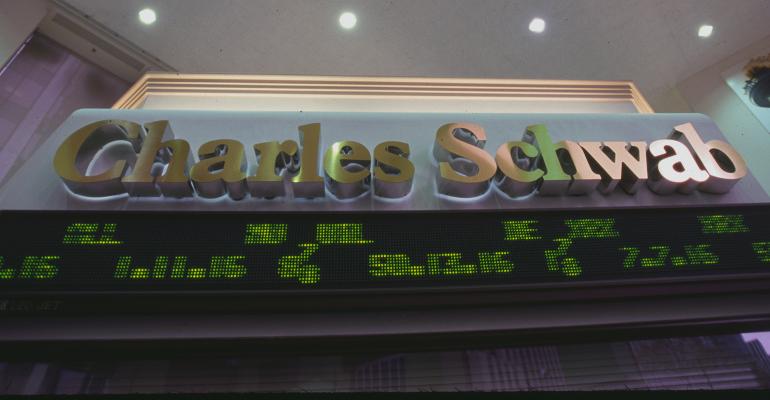Charles Schwab is piloting a direct indexing separately managed account (SMA), with expected availability to advisors and investors sometime next year, according to regulatory documents filed last week. Called “Schwab Personalized Indexing,” the SMA is currently undergoing testing with select Schwab employees and affiliates. The development was first reported by Ignites.
Schwab Personalized Indexing “is designed to provide exposure to a client-selected equity market segment while seeking to enhance after-tax returns relative to the client’s designated index.” The SMA provides access to three different indexes, including one environmental, social and governance (ESG) offering, and has a $100,000 minimum investment per account.
Strategies available in the pilot include the Schwab 1000 Equity, a strategy designed to track and mimic the Schwab 1000 Index, a float-adjusted market capitalization weighted index that includes the stocks of the 1,000 largest publicly traded companies in the United States; the S&P Small Cap 600, a strategy meant to track and mimic the S&P SmallCap 600 Index, a float-adjusted market capitalization weighted index that seeks to measure the small-cap segment of the U.S. equity market; and the MSCI KLD 400 Social, an ESG strategy designed to track and mimic the MSCI KLD 400 Social Index, a capitalization weighted index of 400 U.S. securities that provides exposure to companies with outstanding ESG ratings and excludes companies whose products have negative social or environmental impacts.
The strategies are available only in taxable accounts and include only U.S. equities. For clients who have Schwab as a custodian “Schwab will waive all of its trading commissions, if any, on those accounts managed by [Charles Schwab Investment Management],” according to the documents filed with regulators. The waiver doesn’t extend to non-Schwab brokerage fees.
Direct indexing is an increasingly tantalizing offering for financial services firms hoping to keep existing clients and win over new ones, particularly those interested in the superior after-tax returns promised by indexing offerings. Schwab bought thematic brokerage Motif Investing’s intellectual property and brought over the firm’s founder, Hardeep Walia, and a majority of its development and investing staff after Motif closed in 2020. Since then, Vanguard purchased direct indexing platform Just Invest in July, Morningstar partnered with TIFIN’s Magnifi to bring direct indexing to end investors in August and Betterment laid a foundation for direct indexing with its remodeled custom portfolios announced earlier this month.
“We are excited at the opportunity to deliver an experience that combines the ease of use, sophistication and value investors expect from Schwab,” according to a statement provided by a Schwab spokesperson. “We expect to offer the SMA to both investors and advisors in 2022. With the launch of the pilot, we are using this time to refine our systems prior to a broader launch.” Schwab declined to make Walia available or to indicate the extent to which Motif tech is included in the offering, while the direct indexing product is still in pilot.
Schwab’s pilot program is a “signal moment” for direct indexing, said William Trout, director of the wealth management division at Javelin Strategy & Research. “What Schwab is trying to do is create essentially a starter package for young, presumably well-off investors to take advantage of the benefits of direct indexing,” he said. “The real value around these indexes is obviously that customization and tax management.”
In Trout’s estimation, limiting Schwab’s launch to three indexes is more a product of the pilot than a plan for the future. “It's not that sophisticated. But this is kind of like dipping the toe in the water, and certainly it's an employee pilot and that's part of the story,” he said.
While Schwab isn’t disclosing the extent to which Motif is factoring into this pilot, Trout said Schwab’s fractional shares offering, launched last summer as Schwab Stock Slices, and its direct indexing capabilities both stand to benefit from Motif’s know-how and technologists.
Schwab’s pilot is another indication of direct indexing’s popularity and ability to change how advisors and investors build their wealth, said Jim Dilworth, co-founder and managing partner at Veriti Management, a direct indexing platform that just surpassed $1 billion in assets under management. (Just Invest had climbed over the $1 billion AUM threshold when it was acquired by Vanguard.)
“The primary benefit that you're reading about is actually legit: this idea of full customization, depending on the client's use case. That's where the value for the advisor is the strongest,” he said. Advisors can maintain control of a portfolio and integrate client beliefs, whether religious, environmental, societal or otherwise, into the investments held by the client.
One area where Schwab may encounter pushback from advisors is on the indexes offered by the custodian, said Dilworth. “The advisor likes to be the quarterback. The advisor likes to be in control of hiring managers and have implementation partners to implement strategies. I wonder how much of that control they're willing to leave in the hands of the custodians,” he said.
“[Advisors] have to justify their advisory fee to the client. To the degree to which the client can go directly to the custodian—[advisors are] potentially disintermediating their role” by ceding too much portfolio control to the custodian, Dilworth added.
How advisors navigate competing retail and advisor instances of direct indexing remains to be seen, but eventually direct indexing will be producing individualized, customized portfolios for each client and each goal they have, according to Trout. Along the way, it will upset the way that advisors view risk evaluation and profiling. “Right now your risk profile is stupid,” he explained, pointing out that it is often based on a perfunctory risk tolerance questionnaire and linked closely to a client’s age. “What's the connection between that questionnaire and your actual portfolio?”
Schwab is embarking down a path that allows advisors and end investors to “build an index that reflects your needs on a much more dynamic, interactive way,” he concluded. “We're entering a brave new world of customization.”





